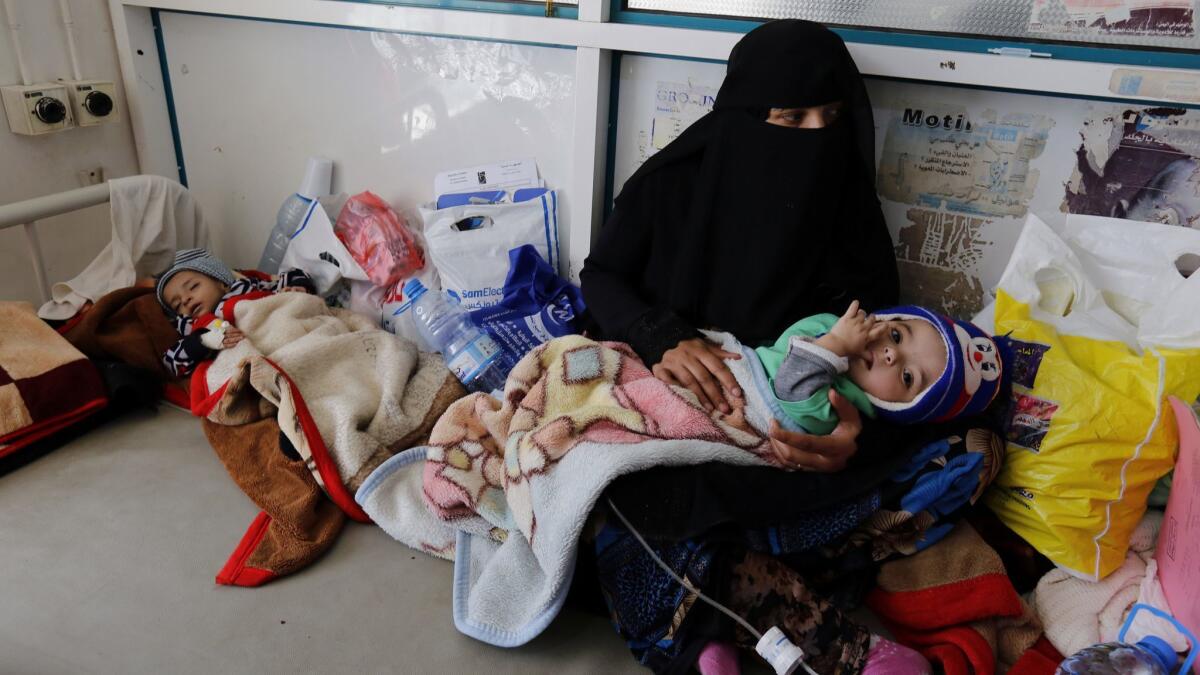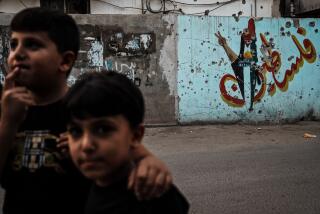Op-Ed: Americans are ignoring the creation of a lost generation of children around the world

A privileged sensibility pervades this country, an implicit we-are-not-them exceptionalism that allows us to believe that American children are separated from, and immune to, the problems afflicting children in the rest of the world.
Just watch a night of television and catch the plentiful ads extolling the bouncy exuberance of our kids — seat-belted into SUVs, waving pennants at sports events or basking in their parents’ praise for doing homework. If you think about it, you’ll soon grasp the deep disparity between the image of childhood in the United States and the global reality of children in crisis.
North to south, east to west, children around the world are increasingly unsafe and preyed upon. For years, their deaths from disease, deprivation, starvation and conflicts of every sort have been on the rise.
This is especially the case, disturbingly, for countries in which the United States has been deeply involved in its post-9/11 global war on terror.
Children around the world are increasingly unsafe and preyed upon.
In the first three-quarters of 2018, for instance, 5,000 children were reportedly killed or maimed in Afghanistan, where the U.S. still has 14,000 troops and countless private contractors. The organization Save the Children estimates that up to 85,000 children under age 5 may have died of starvation in civil-war-torn Yemen. The U.N. Committee on the Rights of the Child counts at least 1,248 children killed and as many wounded in U.S.-backed Saudi airstrikes there since 2015. By the end of 2017, 14,000 children had been reported killed in the war in Syria.
Starvation kills 22,000 children daily worldwide. Nearly half of the world’s 68.5 million displaced people — fleeing violence, poverty or a combination of the two — are children. Many of those 30 million youngsters are hungry, without access to medical care, toilets or clean water, not to speak of schooling, or a future.
Children in refugee camps have often witnessed or experienced atrocities on a mass scale; they have been subject to rape, violence and abuse. They may have watched as their siblings and parents were killed. They may have been conscripted or tortured as war captives. By the hundreds of thousands, they represent a new generation of uncared-for, brutalized and deprived youth. To carry on their war in Yemen, the Saudis have been recruiting — literally, buying — soldiers from Sudan, “desperate survivors of the conflict in Darfur.” Many of them are, reportedly, teenagers as young as 14. In Ukraine, children as young as 8 are being trained to shoot to kill.
Meanwhile, American policymakers have tried to protect this country against the turmoil engulfing the larger world with a military-first foreign policy. As Sen. Lindsey Graham (R-S.C.) recently put it in the wake of President Trump’s decision to withdraw U.S. forces from Syria, “I want to fight the war in the enemy’s backyard, not ours.”
Reality defies this false version of national security. As the 9/11 attacks should have shown us, in a global age of communications, travel and trade, the spawning of a homeless, stateless, rejected, needy and often angry generation worldwide is guaranteed to put us all at risk. And these children’s energy, skill and talent — which could lead to positive contributions — are being summarily squandered.
Enter the Fray: First takes on the news of the minute »
When it comes to creating bitter futures, the Trump administration’s treatment of children at the southern border is of a piece with the chaos elsewhere. Children of all ages, even infants, have been separated from their mothers and fathers, housed in bitterly cold jail-like conditions. We’ve heard their terrified cries on phone recordings; we’ve seen the video of workers slapping, pushing and dragging young immigrants at a detention center in Arizona. In December and January, the first deaths of children were recorded at American border detention centers.
Even among U.S. citizens, children are dangerously vulnerable. Twenty-one percent of children in this country live below the official poverty line, a rate that is the highest among the world’s richest countries. In 2009, a Department of Justice report found that more than 60% of American children witnessed or were the targets of violence “directly or indirectly,” exposure that “is often associated with long-term physical, psychological and emotional harm.”
Children here and around the world should be an American national security priority. Instead of setting an example of detaining children inhumanely at the border, the U.S. should be mounting new global rescue and aid missions especially for kids, pioneering new ways to help them regain viable lives.
The Trump White House, Congress and the American people need to understand that ignoring the global crisis of childhood will soon enough bring it home to the United States, too. We-are-not-them exceptionalism will, in the end, prove to be a fantasy full of unintended consequences. As legal expert Jason M. Pobjoy notes in his book “The Child in International Refugee Law,” “Childhood is a wasting asset — there are no second chances.”
Karen J. Greenberg is the director of the Center on National Security at Fordham Law. She is the author of “Rogue Justice: The Making of the Security State.” Julia Tedesco helped with research for this article, and a longer version of it appears at TomDispatch.com.
Follow the Opinion section on Twitter @latimesopinionand Facebook
More to Read
A cure for the common opinion
Get thought-provoking perspectives with our weekly newsletter.
You may occasionally receive promotional content from the Los Angeles Times.






